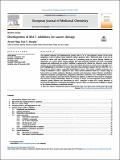| dc.contributor.author | Negi, Arvind | |
| dc.contributor.author | Murphy, Paul V. | |
| dc.date.accessioned | 2021-01-08T12:16:36Z | |
| dc.date.available | 2021-01-08T12:16:36Z | |
| dc.date.issued | 2020-11-24 | |
| dc.identifier.citation | Negi, Arvind, & Murphy, Paul V. (2021). Development of Mcl-1 inhibitors for cancer therapy. European Journal of Medicinal Chemistry, 210, 113038. doi:https://doi.org/10.1016/j.ejmech.2020.113038 | en_IE |
| dc.identifier.issn | 0223-5234 | |
| dc.identifier.uri | http://hdl.handle.net/10379/16438 | |
| dc.description.abstract | The myeloid leukemia cell differentiation protein (Mcl-1) is an anti-apoptotic protein of the B-cell lymphoma 2 (Bcl-2) family, which regulates cellular apoptosis. Mcl-1 expression plays a key role in survival of cancer cells and therefore serves as a promising target in cancer therapy. Besides, its importance as a cancer target, various peptides and small-molecule inhibitors have been successfully designed and synthesized, yet no Mcl-1 inhibitor is approved for clinical use. However, recent development on the understanding of Mcl-1’s role in key cellular processes in cancer and an upsurge of reports highlighting its association in various anticancer drug resistance supports the view that Mcl-1 is a key target in various cancers, especially hematological cancers. This review compiles structures of a variety of inhibitors of Mcl-1 reported to date. These include inhibitors based on a diverse range of heterocycles (e.g. indole, imidazole, thiophene, nicotinic acid, piperazine, triazine, thiazole, isoindoline), oligomers (terphenyl, quaterpyridine), polyphenol, phenalene, anthranilic acid, anthraquinone, macrocycles, natural products, and metal-based complexes. In addition, an effort has been made to summarize the structure activity relationships, based on a variety of assays, of some important classes of Mcl-1 inhibitors, giving affinities and selectivities for Mcl-1 compared to other Bcl-2 family members. A focus has been placed on categorizing the inhibitors based on their core frameworks (scaffolds) to appeal to the chemical biologist or medicinal chemist. | en_IE |
| dc.description.sponsorship | AN thanks the Irish Research Council (GOIPG/2014/1191). PVM thanks Science Foundation Ireland (06/RFP/CHO032; 16/IA/4419) for support. | en_IE |
| dc.format | application/pdf | en_IE |
| dc.language.iso | en | en_IE |
| dc.publisher | Elsevier | en_IE |
| dc.relation.ispartof | European Journal Of Medicinal Chemistry | en |
| dc.rights | Attribution-NonCommercial-NoDerivs 3.0 Ireland | |
| dc.rights.uri | https://creativecommons.org/licenses/by-nc-nd/3.0/ie/ | |
| dc.subject | Mcl-1 inhibitors | en_IE |
| dc.subject | cancer therapy | en_IE |
| dc.title | Development of Mcl-1 inhibitors for cancer therapy | en_IE |
| dc.type | Article | en_IE |
| dc.date.updated | 2021-01-07T09:00:13Z | |
| dc.identifier.doi | 10.1016/j.ejmech.2020.113038 | |
| dc.local.publishedsource | https://doi.org/10.1016/j.ejmech.2020.113038 | en_IE |
| dc.description.peer-reviewed | peer-reviewed | |
| dc.contributor.funder | Irish Research Council | en_IE |
| dc.contributor.funder | Science Foundation Ireland | en_IE |
| dc.internal.rssid | 24261663 | |
| dc.local.contact | Paul Murphy, School Of Chemistry, Room 108, Arts/Science Building, Nui Galway. 2465 Email: paul.v.murphy@nuigalway.ie | |
| dc.local.copyrightchecked | Yes | |
| dc.local.version | PUBLISHED | |
| dcterms.project | info:eu-repo/grantAgreement/SFI/SFI Research Frontiers Programme (RFP)/06/RFP/CHO032/IE/Non peptide peptidomimetics based on macrocycles derived from carbohydrates and biological evaluation./ | en_IE |
| nui.item.downloads | 153 | |


